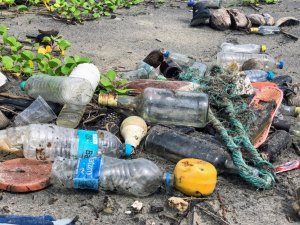I was filming in a supermarket last week – a film about plastic. There were 85 fresh fruit and vegetable products on sale and 81 of them were pre-wrapped in plastic, the remaining four had cellophane bags to put them in. Why? Why are we coating nearly everything we buy in something that gets everywhere, kills wildlife and could be harming us? And why is this still happening even though scientists have been warning of the problem for years and many months after the public were startled from their ignorance by the BBC’s Blue Planet 2. The answer: plastic is great stuff, the skin and bone of consumerism.
Being ‘plastic free’ is a great slogan but a rubbish policy. Plastic is not the moral equivalent of child slavery or animal cruelty – it is useful for creating, protecting and transporting a product. The reason all those supermarket items come in plastic is that retailers and shoppers find it works, it does a job. If consumers were really as anti-plastic as some campaigners would have you believe, the aisles would change tomorrow. But most want speed, convenience and food hygiene: plastic delivers.
But it also delivers contamination to our natural world. This impact is vastly reduced by effective waste collection and treatment systems but these are imperfect in the rich world and not yet a priority in most of the rest, so many rivers run with rubbish.

The second is for government and local authorities. Make the waste collection systems uniform and easily understood across the country. I can’t speak for other countries, but the UK is a riot of different policies across county lines and between cites. The current variety is absurd. It confuses householders and makes it impossible for manufacturers to provide simple instructions on how best be rid of their product. I like bottle deposits too as it immediately turns them from unwanted waste to valuable raw material.
So, there is a clear responsibility for the consumer to care and a need for businesses and politicians to act. This year’s Sustainable Retail Summit provides the perfect forum for discussion on how we can come together to tackle this pressing issue. I hope to see you there!
Tom Heap
SRS Moderator
Environmental, Science and Rural Affairs broadcaster for the BBC

